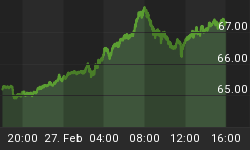Gold continued weak in its performance during September. The yellow metal's price dropped almost 5.5% from $1286.50 to $1216.5 (London PM Fix). In the last Market Overview we came to the conclusion that the real interest rate is one of the main drivers of the gold price. Although the negative relationship between real interest rates and gold prices does not always hold, the recent medium-term declines (including the last month) were probably, to a large extent, caused by the rise in the long-term real interest rates.
Graph 1: 30-year (green line) and 10-year real interest US rate (red line) from 2013 to 2014

However, many analysts write that gold suffered mainly from strengthening of the US dollar (we have also written about the short-term link between gold and USD - it was useful to time the local bottom in gold earlier this month). Indeed, the U.S. Dollar Index rose 3.85% in September from 82.7480 to 85.9360, which supports claims that it was the relentless strength of the U.S. dollar that drove changes in the gold market in the last few months.
The impact of currency exchange rates on the gold market has strong theoretical and empirical grounds. In their paper "The price of gold and the exchange rate" Sjaastad and Scacciavillani found, that between 1982 and 1990, fluctuations in the real exchange rates among the major currencies accounted for nearly half of the observed variation in the spot price of gold (one can more or less think about the above as if almost half of gold's movement was caused by moves in the currency market). Sjaastad's article and the World Gold Council's third volume of its gold investors reports Risk management and capital preservation confirmed that U.S. dollar has strongest impact on the gold price. According to the latter, between Q3 1976 and Q1 2013 the US dollar was the most important factor that explained long-term fluctuations, twice as important as other long-term macroeconomic variables.
Thus, the relationship between the U.S. dollar and gold is certainly worth analyzing. Undoubtedly, the U.S. dollar's effect on gold prices is intertwined with the real interest rates' impact. Our analysis of the link between the greenback and the yellow metal in this edition of Market Overview will complement our previous remarks and will help to understand the movements in the price of gold. Financial media like to repeat that dollars and gold are inversely correlated: when the dollar weakens, gold rises, and when gold rises, the dollar declines. Although generally true, investors should not accept it as the only gospel written (and as you can see in our Correlation Matrix tool, the correlation between gold and USD can be different in the short term, medium term and long term). Even the most accurate correlation cannot replace careful examination of how exactly the U.S. dollar affects the gold market.
The bottom line is that the U.S. dollar is generally inversely related to gold, which is considered as an alternative currency to the greenback. However, this relationship does not always hold, because gold is something more than a dollar hedge - it is also a fiat monetary system hedge, so it may rise with U.S. dollar being flat due to parallel declines in all paper currencies or change in tandem with greenback due to developments in foreign markets. Thus, to wisely invest in the gold market investors should understand factors driving the U.S. dollar, with monetary policy of the major central banks being the most important. Having this in mind, we claim that the recent strengthening of the dollar might have been rather temporary, since it was based on wrong expectations (at least for a while) that the Fed would hike rates rather sooner than later. Hence, to paraphrase Mark Twain, the reports of a new dollar bull market and gold's death was an exaggeration. Over the long run the dollar doesn't have to move much higher, but the outlook for gold remains bullish for the coming years.
Thank you.
Stay updated on the latest developments in the gold market and US economy by joining our gold newsletter. It's free and you can unsubscribe in just a few clicks.















